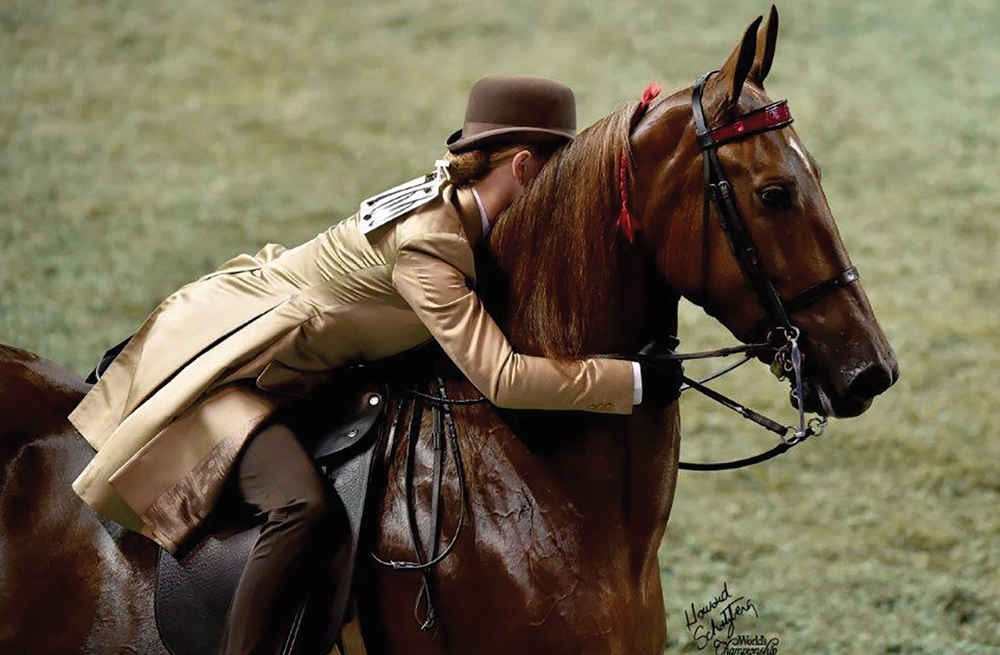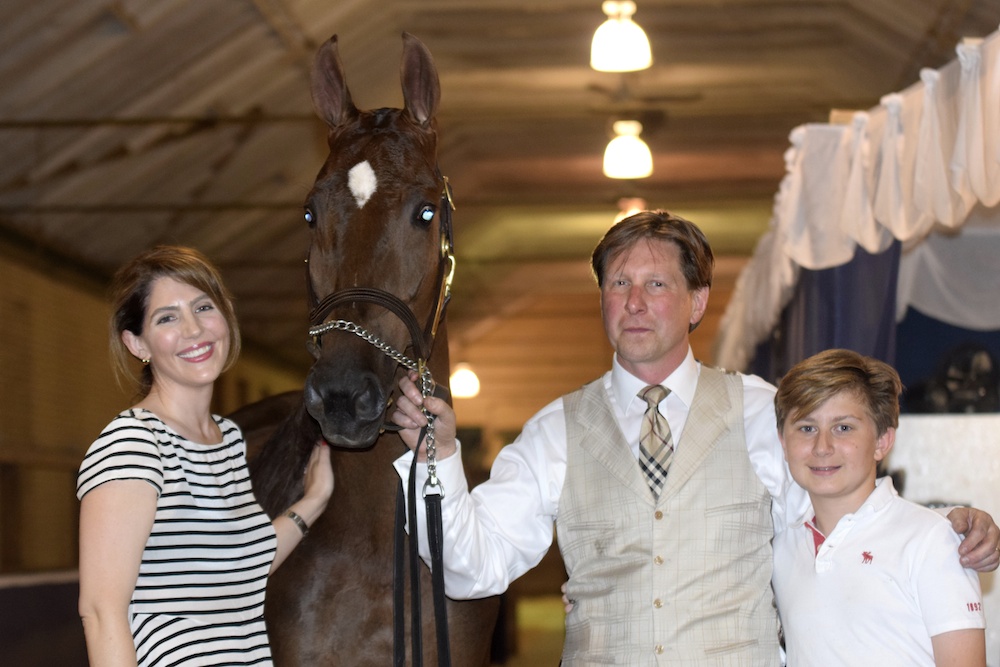 When it comes to mares, their reputations precede them. From often-touted clichés to humorous tee-shirts, it is clear that they are known for being touchy, moody and just generally difficult. Yet there are a number of stunningly successful mares on today’s show circuit, proving that these complicated creatures can still go on to great success. Some even believe that a good mare has the potential to be an even better show horse than a gelding or stallion, if you are able to bring out the best in them – something that takes patience, cooperation and a willingness to listen and learn.
When it comes to mares, their reputations precede them. From often-touted clichés to humorous tee-shirts, it is clear that they are known for being touchy, moody and just generally difficult. Yet there are a number of stunningly successful mares on today’s show circuit, proving that these complicated creatures can still go on to great success. Some even believe that a good mare has the potential to be an even better show horse than a gelding or stallion, if you are able to bring out the best in them – something that takes patience, cooperation and a willingness to listen and learn.
Mary Orr, trainer at High Caliber Stables in Greensboro, North Carolina, knows mares better than most. From World’s Grand Champion CH Our Charming Lady to CH Moonlight Memories, Jaunty Janette, Riva Diva, CH Meadowlark Jubilee, Susie McGee, Our Sunflower, CH Betty Grable and Cameo's Carte Blanche, she has trained a number of special mares to World and National Championships, each one with her own special quirks.
Our Charming Lady, perhaps the most prominent of these mares, is kind and quiet in the stall, but when it came to training and showing, Mary knew enough to “do it her way.”
“When asked what is ‘her way,’ the answer is simple: if she does not like something you will know by her behavior,” Mary said. “When she is happy she is on fire, and there is no question she is pleased with the program.”
She has passed this trait on to many of her offspring, who have been equally fun to work with.
“We have learned to be patient and let them think that it is their idea,” Mary said. “That plan has worked well and allowed them to progress and be happy with their job, but only on their terms!”
Mary has found the old adage, “You tell a gelding, ask a mare and discuss it with a stallion,” to be accurate, but has her own addition to it.
“Sometimes, however, you might ask as much as you want, but you still might not get the answer you want,” she said.
Instead of fighting in these situations, Mary often chooses to make some concessions. Though Jaunty Janette was a game mare in the show ring, in her stall she was shy, and would only allow her caretaker, Beto, to clip, bridle or brace her. Riva Diva had many opinions as well.
“Quite frankly she knew she was the best and expected to be treated as such,” Mary said. “There was no question who was in charge.”
Though Mary describes Moonlight Memories as “a pure joy to work with,” even “Evie” has a two quirks – she kicks in her stall if anyone cracks a whip during training sessions, and she will only wear a half brace on her tail.
“I dare someone to try to put a full brace on her,” Mary said. “When she says no she means no.”
Mary believes that the key to working successfully with a mare is to pay attention and listen.
“We have found that if you take the time to learn the personality of the mare you will find out when to stand strong in a tense situation and when to back off,” Mary said. “It is all about picking your battles. The goal is to become a team, and that is more important than being the ‘winner.’”
And you never want to take away a mare’s spark.
“Their attitude is what makes them special, if you can send it in the right direction,” Mary said.

“I don’t think Bret or I would generalize that mares are totally different,” Susi said. “You do things differently for each horse, mare or gelding. With a mare, especially if they’re ‘mare-ish,’ – I hate stereotypes – you try to find a way to do things their way, but I think that’s the case in general, too. It’s not about submission on any level. You try and find ways to make them happy and comfortable.”
Still, Susi agrees that there are certain qualities that are more prevalent in mares, including sensitivity.
“I definitely think mares are more sensitive to different types of training or interaction,” she said. “They end up taking a little more of your time, but a different kind of time, not just always training time. There is a lot of downtime you spend with them to get their trust.”
And because they are so sensitive, you often need to think things through more when working with them. This is demonstrated perfectly in the young five-gaited sensation There’s Something About Mary. “Molly,” as she is called, is a stoic, business-like mare on the outside, but Susi knows her well enough to recognize that she internalizes her stress.
“She is sensitive and tries so hard,” Susi said. “You could easily abuse her by taking advantage of her gameness, which is not what you want to do. You spend your time with her trying to get her to relax.”
In addition to this sensitivity, mares are also more prone to certain bad habits, such as kicking, whether in cross-ties, when getting hooked to the jog cart, or when a rider is mounting. As with any horse displaying these issues, whether mares, geldings or stallions, it is important to discern the reason for the negative behavior, and then try to find ways to avoid it.
With mares, Susi believes that this behavior often flows from a place of insecurity.
“In some way their instinct is telling them to protect themselves,” she said. “When you have that kind of stuff going on, whether kicking or biting, the biggest problem I see is when people decide to ‘show them who’s boss.’ That’s never a good answer, and I think it just reinforces the behavior.”
Undesirable behaviors such as kicking can also be hormonal in nature, something that can be controlled thanks to products such as Regu-Mate.
“If they’re doing those sort of things that’s when we’d try them on Regu-Mate.” Susi said. “You’ll notice a difference in the mares you show that way. You take them off for the winter because you’re going to breed them, and some of that behavior comes back, then you put them back on Regu-Mate and they’re fine.”
It makes life easier for the mare’s handlers, but it makes the mare happier, too.
“In the end you want to keep them comfortable,” Susi said. “Their attitude may be difficult because they’re uncomfortable, because they’re hormonal. You want to take that out of the equation as much as possible.”
Susi has also noticed that how a mare is handled early in life when first manifesting these behaviors has a great effect on how she will behave later.
“If they get knocked around and muscled around when they start that, it reinforces the behavior,” Susi said.
Alternatively, if they are handled correctly from the beginning, behaviors like biting and kicking can become minimal, or disappear entirely. Though, of course, every mare is different.
“There are some who absolutely give you no problems at all, and then there are some that, wow, it’s tough without a little help from the vet,” Susi said. “But we’ve been lucky; we haven’t had many that have been that hard to deal with.”
But even the difficult ones can be worth the extra effort they require.
“I think they make you stay on your game which makes you better,” Mary said. “You can't help but love them and their opinions.”
And few things can compete with an exceptional show mare.
“There are some great mares in history that had this presence, gameness, work ethic,“ Susi said. “They were ‘handsome mares.’ They may not have been beauty queens, but they were beautiful conformation-wise. And when you get all those ingredients in one package, that big body type and stake horse look, which is rare, there’s the difference.”
Mary agrees that horses like that can be more than ribbon winners – they can be life changing.
“The best part about mares is that, with all that attitude, they can be an outstanding performance horse that not only lights up the show ring but lights up your life,” she said.



